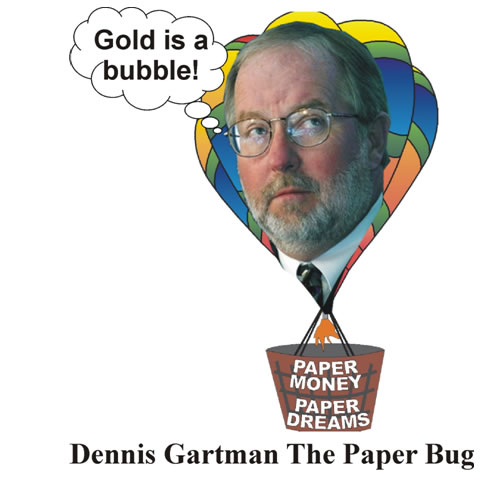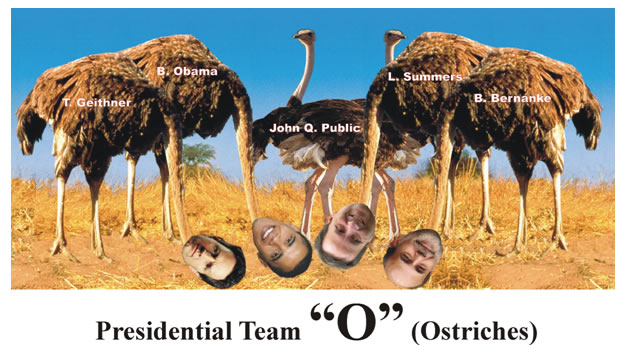Deflationary Economic Depression 2010, Ready or Not Here it Comes!
Economics / Great Depression II Dec 06, 2009 - 08:31 PM GMTBy: Darryl_R_Schoon
 Much has been written about the Great Depression and the present crisis. There is much that is similar and some that is not. The differences explain why events have unfolded differently. The similarities explain why the end will be the same.
Much has been written about the Great Depression and the present crisis. There is much that is similar and some that is not. The differences explain why events have unfolded differently. The similarities explain why the end will be the same.
Deflationary depressions occur after the collapse of large speculative bubbles. The collapse of the 1920s US stock market bubble, then the largest bubble in history, caused the Great Depression of the 1930s. The collapse of the far larger dot.com and US real estate bubbles will cause the next.
WAITING FOR THE OTHER SHOE TO DROP
A daisy chain of disaster
The present economic crisis is similar to that of a patient who has suffered a massive near-fatal heart attack. Presently surviving only because of constant care and unprecedented levels of medication, it is the unprecedented levels of medication that will ultimately cause the patient’s death.
The amount of monetary stimulus keeping the global economy afloat has never been greater. Two of the largest economies in the world, the US and Japan, now have interest rates close to zero and, along with the UK, are engaged in “quantitative easing”, a monetary phenomena akin to self abuse, i.e. self-stimulation.
Extreme measures of monetary stimulation via money printing are necessary to counteract the deflationary pressures set in motion by declining asset values against which massive amounts have been borrowed. But, in the end, creating money out of nothing will reduce the value of money to exactly that—nothing.
This is the path upon which governments and central bankers have embarked. Fraught with danger and pitfalls, it was not their first choice—it was their only choice—and the rising price of gold is a measure of how far on the path they have traveled. Just prior to the collapse of the dot.com bubble, gold was $300 per ounce. Today, it has exceeded $1200.
It is not a coincidence that as monetary debasement has reached unprecedented levels the price of gold has also reached unprecedented heights. As money printing has increased, so, too, has the transparency of its fraud. Money printed in increasing quantities becomes increasingly worthless; and, gold, as an intrinsic store of value, reflects the accelerating debasement of money in its price.
Not all believe, however, that gold is a function of monetary debasement.

In How To Survive The Crisis and Prosper In The Process I discuss common reactions in these uncommon times. Because periods of systemic monetary distress are rare, most will misinterpret economic signs during what I call The Time of the Vulture.
In times of expansion, it is to the hare the prizes go. Quick, risk taking, and bold, his qualities are exactly suited to the times. In periods of contraction, the tortoise is favored. Slow and conservative, quick only to retract his vulnerable head and neck, his is the wisest bet when the slow and sure is preferable to the quick and easy.
Every so often, however, there comes a time when neither the hare nor the tortoise is the victor. This is when both the bear and the bull have been vanquished, when the pastures upon which the bull once grazed are long gone and the bear's lair itself lies buried deep beneath the rubble of economic collapse.
This is the time of the vulture, for the vulture feeds neither upon the pastures of the bull nor the stored up wealth of the bear. The vulture feeds instead upon the blind ignorance and denial of the ostrich. The time of the vulture is at hand.
Chapter One, How To Survive The Crisis and Prosper In The Process, 1997, www.survivethecrisis.com
Most investors are unprepared for times of deep systemic change; times when both bulls and bears are unprepared for what will be. Ignorance will provide no protection, however, and those who do not understand will pay a high price for their prolonged denial.
… Being risk taking or risk adverse is often due to personality. But people do choose to be ostriches, especially in times of change. This is because denial of change—the refuge of the ostrich—gives all of us a sense of security. Though the security is as false as the comfort it offers, unfortunately many, if not most of us, will choose to be ostriches in the days ahead.
Chapter One, How To Survive The Crisis and Prosper In The Process, 1997, www.survivethecrisis.com

In times of deep change, few will understand what is happening and instead of changing, most will persist in clinging to the old even as it is being swept away. Events change but human nature rarely does—at least not yet.
This is a process that has happened countless times throughout history. That it is happening today is either fortune or misfortune. Whether it is one or the other will be determined by each of us.
CAPITALISM’S FINAL PAROXYSM
The deep systemic change now in motion will result in the collapse of capitalism. Capitalism, a system that replaced money and savings with credit and debt, is in disarray as never before.
Capitalism: It’s a bit like borrowing from Peter to pay Paul. Except in the case of capitalism, it’s your money you’re borrowing, Peter and Paul are the same person and he’s a banker.
Capitalism has long been identified with free markets. In actuality, capitalism is any system where the banker’s capital, i.e. credit, has become the engine of economic growth and debt has replaced savings as an asset. Free markets existed long before being exploited by bankers and will exist long after.
Capitalism, however, does thrive in free markets because capitalism, like the parasite it is, thrives best when attached to a vibrant and expanding host. Unfortunately, its host is far less vibrant now that the global economy is contracting and succumbing to the parasite’s destructive appetite.
Not since the deflationary collapse of the Great Depression has the banker’s system of credit and debt been under so much stress. Today, that stress has been temporarily contained. Tomorrow will be another story.
GOLD—THE BAROMETER OF SYSTEMIC DISTRESS
From its central bank induced lows in the 1990s, the price of gold has almost quintupled. Today, gold seems expensive. In the future, today’s price will seem like a bargain.
We are now approaching the final stage of the collapse of the bankers’ house of cards; when debt levels are so high they can no longer be serviced, crushing those still trapped by credit’s promissory lure.
Hyman Minsky, the late American economist, made a seminal contribution to the study of debt in his financial instability hypothesis. In the early stages of capitalist systems, interest and principal can be serviced out of the debtor’s cash flow. In the final stage of “mature capitalist systems”, they cannot.
Capitalism’s final stage is what Minsky calls “ponzi-financing”, when debt payments can only be made by additional borrowing. This is what the US, the UK and Japan are doing today, having to borrow against tomorrow in order to pay yesterday’s bills.
For 50 years, not one Dollar of new debt created by the US government to fund the activities it does not wish to tax for has been repaid. The debt has simply been “re-financed” with new debt being sold to retire the existing debt.
The Privateer, Late November 09, issue 6430100, www.the-privateer.com
At some point, the end finally arrives. Ponzi-financing cannot service debt forever. Investing in unhedged paper assets is the bet that it can. Gold is the bet that it cannot.
TYRANNY FREEDOM & THE FUTURE
The ideal tyranny is that which is ignorantly self-administered by its victims. The most perfect slaves are, therefore, those which blissfully and unawaredly enslave themselves.
When a well-packaged web of lies has been sold gradually to the masses over generations, the truth will seem utterly preposterous and its speaker a raving lunatic.
Donald James (1931-2008)
The movie, The Matrix, has been described as a metaphor for life. The economic matrix in which we are enmeshed is no less real or unreal. Escape and/or freedom within it exists but it is not easily achieved.
Those who wield power within the current economic system are engaged in a life and death struggle to maintain it. Supporting their efforts are the oppressed who rightfully believe the end of economic tyranny will only come at a price they are unwilling to pay.
Those fearful of systemic change include both who benefit from the system and those oppressed by it. Neither possesses the requisite power to prevent it.
Power is no more control than credit is money
We are already seeing evidence of deep systemic change. The falling away of the old will make way for what is to be; and, despite our efforts, none of us can stop it. If we could, we would all still be living in trees.
Buy gold, buy silver, have faith.
By Darryl Robert Schoon
www.survivethecrisis.com
www.drschoon.com
blog www.posdev.net
About Darryl Robert Schoon
In college, I majored in political science with a focus on East Asia (B.A. University of California at Davis, 1966). My in-depth study of economics did not occur until much later.
In the 1990s, I became curious about the Great Depression and in the course of my study, I realized that most of my preconceptions about money and the economy were just that - preconceptions. I, like most others, did not really understand the nature of money and the economy. Now, I have some insights and answers about these critical matters.
In October 2005, Marshall Thurber, a close friend from law school convened The Positive Deviant Network (the PDN), a group of individuals whom Marshall believed to be "out-of-the-box" thinkers and I was asked to join. The PDN became a major catalyst in my writings on economic issues.
When I discovered others in the PDN shared my concerns about the US economy, I began writing down my thoughts. In March 2007 I presented my findings to the Positive Deviant Network in the form of an in-depth 148- page analysis, " How to Survive the Crisis and Prosper In The Process. "
The reception to my presentation, though controversial, generated a significant amount of interest; and in May 2007, "How To Survive The Crisis And Prosper In The Process" was made available at www.survivethecrisis.com and I began writing articles on economic issues.
The interest in the book and my writings has been gratifying. During its first two months, www.survivethecrisis.com was accessed by over 10,000 viewers from 93 countries. Clearly, we had struck a chord and www.drschoon.com , has been created to address this interest.
Darryl R Schoon Archive |
© 2005-2022 http://www.MarketOracle.co.uk - The Market Oracle is a FREE Daily Financial Markets Analysis & Forecasting online publication.



